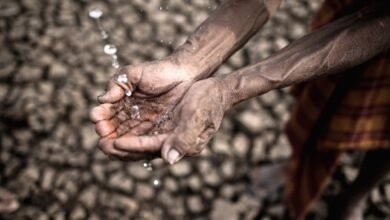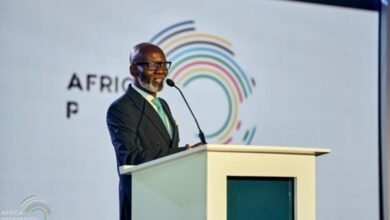Africa, world leader in global health innovation
The launch of the World Health Organization’s « World Mental Health Report 2022 » is an opportunity to analyze the unique biotope of mental health in Africa. As the decades pass, the situation worsens. Indeed, current estimates suggest that nearly one billion people suffer from mental health disorders – including nearly 110 million living on the African continent with limited access to care.
By Marie-Alix de Putter, President – Bluemind Foundation
The COVID-19 pandemic has shown the negative impact that a virus can have on global economies and societies and on the collective achievement of the Sustainable Development Goals (SDGs). More than anything else, the pandemic has revealed that mental health is one of the greatest challenges of modern society which, beyond the immediate effects on the family, the relational fabric and the caregivers, affects all spheres of public life: education, employment, security, law and justice. This unprecedented context has resulted in an increase in depression and suicide associated with isolation, triggering a wave of public interest and awareness for mental health.
Yet despite its prevalence, mental illness is still a taboo in Africa. As a result, people with mental health problems are often discriminated against and socially stigmatized, leading to a denial that prevents them from seeking needed help. In addition, despite costing national economies billions of dollars in lost revenue each year, mental health remains underfunded and under-resourced.1
« While the WHO advocates one mental health therapist for every 5,000 inhabitants, the African average is 1 per 500,000 »
According to World Health Organization (WHO) data, the average expenditure on mental health worldwide is estimated to be less than $2 per person per year, and less than $0.25 in low-income countries2. Yet poor mental health costs the global economy an estimated $2.5 trillion per year in economic productivity and direct care costs. This cost is expected to rise to US$16 trillion by 20303.
The systemic underfunding of mental health services is also reflected in the scarcity of available human resources. While the WHO advocates one mental health therapist for every 5,000 inhabitants, the African average is 1 per 500,000. Taken individually, the figures are even more serious in some French-speaking African countries. For example, in Côte d’Ivoire, there are about 50 therapists for more than 25 million inhabitants4. In Togo, the ratio is 1 for 1,600,000 inhabitants; in Cameroon, it is 1 for 2,600,000 inhabitants5.
Globally, approximately 280 million people suffer from depression6. In Africa, nearly 66 million women7 – roughly equivalent to the population of France – are prone to depression and anxiety disorders. Overall, on the continent, « less than 10% of the population has access to mental health care, » according to the United Nations8. In this regard, it is worth noting that armed conflict and climate change are leading to an exacerbation of pre-existing mental health disorders. 9
This is an untenable situation that calls for immediate action. On the one hand, there is need for an innovative language approach by shifting the perspective from economic cost to social return on investment. For example, a recent study led by the WHO showed that each US dollar invested in intensifying the treatment of depression and anxiety could yield a return of 4 US dollars in terms of improved health and capacity to work10.
On the other hand, as mental health struggles with a temporality that is almost never conducive to it, there is a need to enhance, strengthen and sustain its visibility and value through civil society organizations. In a socio-cultural environment where difficulties are juxtaposed, it is necessary to propose innovative solutions adapted to local realities.
« Innovation in scientific research and the development of actions on the ground in the African mental health landscape has existed for the past decade »
Innovation in scientific research and the development of actions on the ground in the African mental health landscape has existed for the past decade. This is evidenced by organizations such as the Friendship Bench (Zimbabwe), the Shamiri Institute (Kenya) and the Bluemind Foundation (West and Central Africa).
Thus, born from the empirical observation that African women talk to their hairdressers; supported by the report of cross studies between African women and their hairdressers published in November 2021 by the Bluemind Foundation, Heal by Hair is the first movement of hairdresser ambassadors in mental health in Africa. This low-cost program, which is a short and innovative three-day training cycle, aims to make professional hairdressers the first links in the mental health care chain in Africa. It is also about empowering women to take control of their mental health while giving them the keys and social incentives to develop their businesses. The inaugural session of the Heal by Hair program was held in Abidjan (Côte d’ivoire) from April 4 to 6, 2022. After a call for applications that received nearly 250 applications, 22 laureates from the popular communes of Abobo, Cocody and Yopougon were certified. And through them, nearly 8,000 women will find the help they need. Abidjan marks the very first step in a series of free trainings. The program will expand to several other countries, including Cameroon and Togo. With the ultimate goal of contributing to the improvement of the mental health and well-being of African women through the hairdresser’s chair, Bluemind Foundation aims to train 1,000 hairdressers across 20 cities in Africa. It also seeks to contribute to the improvement of the mental health of 3,000,000 African women by 2035.
The Friendship Bench, developed in Zimbabwe by Dr. Dixon Chibanda, is another example of a successful innovative intervention since 2006. This project consists of training grandmothers in the treatment of depression to compensate for the lack of psychiatrists and psychologists in the country. With this program, grandmothers offer free listening and counseling to patients suffering from depression. This brief psychological intervention originated in Zimbabwe and has been implemented in Kenya, Tanzania and Malawi as well as in Western countries such as Canada and the United States.
With rates of emotional distress and suicide among youth on the rise, African youth are not left behind when it comes to mental health innovation. In addition to the idea lab and incubators for mental health projects run by the Bluemind Foundation’s Teen Youth Tank, in Kenya om Osborn co-founded the Shamiri Institute.
It is an organization that uses cutting-edge social science research and on-the-ground knowledge to develop and implement tools that improve the mental health and well-being of African youth. The Thrive! project is currently being rolled out in Kenya.
« This is a health emergency, a democratic challenge and a civic commitment »
An African proverb says « The sun does not forget a village just because it is small. » Thus, in contexts of entangled challenges, civil society is making a significant contribution to a major public health problem in our societies. There is no health without mental health. And, health is a key determinant of human and economic development in Africa. Enabling a sustainable future for our children means realizing that there will be no development without access to care for all people suffering from mental health disorders. This is a health emergency, a democratic challenge and a civic commitment. It is time to act, finally !
1 World Health Organisation (2003). Investing in Mental Health. Geneva:World Health Organisation. 2 World Health Organisation (2011). Mental Health Atlas: 2011. Geneva: World Health Organisation.
3 Bloom DE, Cafiero ET, Jane-Llopis E, Abrahams-Gessel S, Bloom LR, Fathima S, Feigl AB, Gaziano T, Mowafi M, Pandya A, Prettner K, Rosenberg L, Seligman B, Stein A and Weinstein C (2011). The global economic burden of non-communicable diseases. Geneva: World Economic Forum.
4https://www.lemonde.fr/afrique/article/2020/01/28/les-guerisseurs-traditionnels-nouveaux-allies-des-psychiatres-en-cote-d- ivoire_6027545_3212.html
5 Sous-direction de la santé mentale – ministère de la Santé publique du Cameroun (MINSANTE) – 2021
6 Institute of Health Metrics and Evaluation. Global Health Data Exchange (GHDx). http://ghdx.healthdata.org/gbd-results- tool?params=gbd-api-2019-permalink/d780dffbe8a381b25e1416884959e88b (Accessed 1 May 2021).
7 Patel V, Saxena S, Lund C, Thornicroft, Baingana F, Bolton P, Chisholm D, Collins PY, Cooper JL, Eaton J, Herrman H, Herzalla MM, Huang Y, Jordans MJD, Kleinman A, Medina-Mora ME, Morgan E, Niaz U, Omigbodun O, Prince M, Rahman A, Saraceno B, Sarkar BK, De Silva M, Singh I, Stein DJ, Sunkel C and Unutzer J (2018). “The Lancet Commission on global mental health and sustainable development.” The Lancet, 392(10157):1553-1598.
8 https://unric.org/fr/le-sous-financement-de-la-sante-mentale-pourrait-couter-tres-cher/
9 Levy BS and Sidel VW (2016). “Documenting the effects of armed conflict on population health.” Annu Rev Public Health, 37:205-18.
10.Chisholm D, Sweeny K, Sheehan P, Rasmussen B, Smit F, Cuijpers P and Saxena S (2016). “Scaling-up treatment of depression and anxiety: a global return on investment analysis.” The Lancet Psychiatry, 3(5):425-424.






